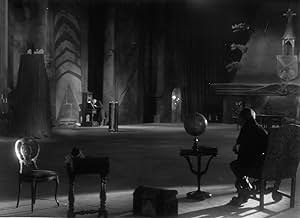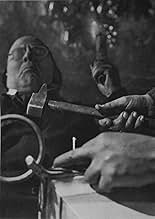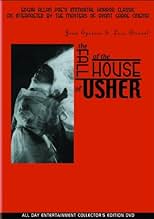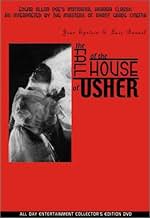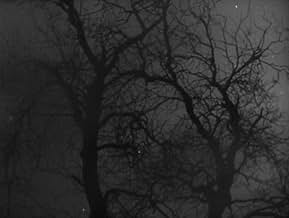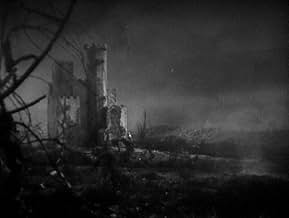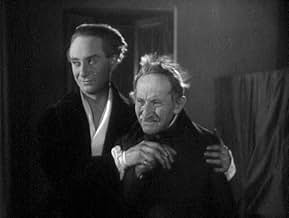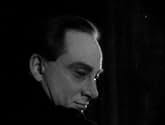NOTE IMDb
7,2/10
4,9 k
MA NOTE
Allan visite la sinistre maison de la famille Usher, où son ami Roderick peint un portrait de sa femme Madeline, souvent malade. Le portrait semble absorber la vie de Madeline, la menant len... Tout lireAllan visite la sinistre maison de la famille Usher, où son ami Roderick peint un portrait de sa femme Madeline, souvent malade. Le portrait semble absorber la vie de Madeline, la menant lentement à sa mort.Allan visite la sinistre maison de la famille Usher, où son ami Roderick peint un portrait de sa femme Madeline, souvent malade. Le portrait semble absorber la vie de Madeline, la menant lentement à sa mort.
- Réalisation
- Scénario
- Casting principal
Avis à la une
Wow! Words cannot describe how absolutely magical this film is, but I will try. Its not often that a film will truly captivate me from moment one as this one has, especially in the world of silent film. Its been a long time since I've been glued to the screen in complete rapture. Granted, I like the silent medium and of course I respect it, but usually I watch them as a piece of film history; I see them for what they are and judge them only amongst their peers: other silent films. But this silent film is like no other! There were many times when I felt as though if Guy Maddin were to make a actual serious film this would be it. Anyone who has seen 'Cowards Bend The Knee' or 'Saddest Music In The World' will know what I'm referring to. Throughout the film I kept thinking that it looked "new" and was made to look old. Some of the special effects such as the swirling fog were just mesmerizing so much so that I found myself wondering why in our modern day we haven't done something so simple yet effective (at least as compared to the films I've experienced).
Even the score that they created for it was incredible. There were some scenes in the beginning of the film, especially ones where Allan was approaching the house, that I didn't think quite fit, but for the rest of the 95% of the film it went along with the action of the film perfectly.
While everything in the film is as close to perfect as film gets, I must point out the acting was so well done as to almost bring me to tears. I cant quite explain how that is possible, but it is. Each tiny emotion shows through so remarkably well. I really would love to commend the actor who played Roderick Usher for his wonderful display. I even feel right in comparing his acting to the likes of the female lead in 'The Passion Of Joan Of Arc' -- and thats hard to beat!
Oh, and the cinematography! Its absolutely impeccable! And I'm not just saying that due to the fact that "its the best they could do back then". It really could rival any modern day film in that regard. It makes me miss shots of a large looming building from down below instead of the aerial helicopter shots most films use now; so macabre and eerily inviting. This film was definitely ahead of its time thats for sure.
I'm not sure how much a screenplay translates to a silent film, but whatever/however Bunuel contributed, it definitely worked. Even though there weren't any overtly surrealistic things going on, you could definitely smell the Bunuel in it. The film is like a dream that you don't want to wake up from even though at its heart it is a nightmare.
Even the score that they created for it was incredible. There were some scenes in the beginning of the film, especially ones where Allan was approaching the house, that I didn't think quite fit, but for the rest of the 95% of the film it went along with the action of the film perfectly.
While everything in the film is as close to perfect as film gets, I must point out the acting was so well done as to almost bring me to tears. I cant quite explain how that is possible, but it is. Each tiny emotion shows through so remarkably well. I really would love to commend the actor who played Roderick Usher for his wonderful display. I even feel right in comparing his acting to the likes of the female lead in 'The Passion Of Joan Of Arc' -- and thats hard to beat!
Oh, and the cinematography! Its absolutely impeccable! And I'm not just saying that due to the fact that "its the best they could do back then". It really could rival any modern day film in that regard. It makes me miss shots of a large looming building from down below instead of the aerial helicopter shots most films use now; so macabre and eerily inviting. This film was definitely ahead of its time thats for sure.
I'm not sure how much a screenplay translates to a silent film, but whatever/however Bunuel contributed, it definitely worked. Even though there weren't any overtly surrealistic things going on, you could definitely smell the Bunuel in it. The film is like a dream that you don't want to wake up from even though at its heart it is a nightmare.
This memorable adaptation of Edgar Allan Poe's "The Fall of the House of Usher" is particularly impressive in its use of visuals and in the macabre, disorienting atmosphere that it creates, which fits in well with the story. Jean Epstein made some rather significant changes to the story, but as a movie it all works very well.
The story changes the central relationship between Roderick and Madeline, and in so doing discards some of Poe's themes, but adds some new ones of its own. Likewise there are other differences as the story unfolds, but Epstein had his own consistent conception of the possibilities in the story, so that it's neither better nor worse than Poe's idea, just different - they are both creative and fascinating conceptions in their own way.
The settings and visual effects are very effective in establishing the atmosphere, and in setting off some of the themes of the story. Some of them, such as the enormous array of flickering candles by which Roderick works, are used as recurring images, with surprisingly haunting results. The pace with which the images come at the viewer is also used as part of the effect. It's quite a distinctive accomplishment, and it's a movie that you won't forget for a while.
The story changes the central relationship between Roderick and Madeline, and in so doing discards some of Poe's themes, but adds some new ones of its own. Likewise there are other differences as the story unfolds, but Epstein had his own consistent conception of the possibilities in the story, so that it's neither better nor worse than Poe's idea, just different - they are both creative and fascinating conceptions in their own way.
The settings and visual effects are very effective in establishing the atmosphere, and in setting off some of the themes of the story. Some of them, such as the enormous array of flickering candles by which Roderick works, are used as recurring images, with surprisingly haunting results. The pace with which the images come at the viewer is also used as part of the effect. It's quite a distinctive accomplishment, and it's a movie that you won't forget for a while.
A stranger called Allan (Charles Lamy) goes to an inn and requests transportation to the House of Usher. The locals remain reluctant, but he gets a coach to transport him to the place. He is the sole friend of Roderick Usher (Jean Debucourt), who leaves in the eerie house with his sick wife Madeleine Usher (Marguerite Gance) and her doctor (Fournez-Goffard). Madeleine is the beloved muse and model and is being painted by Roderick. When she dies, Roderick does not accept her death, and in a dark night, Madeleine returns.
For those like me that have not read the story of Edgar Allan Poe, the conclusion of "La Chute de la Maison Usher" is quite confused. However, the Gothic cinematography is very impressive, recalling the German Expressionism. It is amazing how Jean Epstein was able to produce such atmosphere, considering the primitive technology of 1928, with difficulties in lighting, sensibility of films, edition table and portability of cameras. However, the shadows and lights are really amazing in this black and white film. This movie was the first work of Luis Buñuel in the cinema industry, working as assistant of Jean Epstein. Just as a curiosity, the resemblance of Charles Lamy with Carlos Alberto Parreira, the coach of the Brazilian soccer team, is incredible. My vote is nine.
Title (Brazil): "A Queda da Casa de Usher" ("The Fall of the House of Usher")
For those like me that have not read the story of Edgar Allan Poe, the conclusion of "La Chute de la Maison Usher" is quite confused. However, the Gothic cinematography is very impressive, recalling the German Expressionism. It is amazing how Jean Epstein was able to produce such atmosphere, considering the primitive technology of 1928, with difficulties in lighting, sensibility of films, edition table and portability of cameras. However, the shadows and lights are really amazing in this black and white film. This movie was the first work of Luis Buñuel in the cinema industry, working as assistant of Jean Epstein. Just as a curiosity, the resemblance of Charles Lamy with Carlos Alberto Parreira, the coach of the Brazilian soccer team, is incredible. My vote is nine.
Title (Brazil): "A Queda da Casa de Usher" ("The Fall of the House of Usher")
First and foremost: I love the tale of "House of Usher", regardless of which film version, and I try to encourage as many people as humanly possible to check out this haunting story of agony and Gothic damnation
So, I swear, if one more person replies me with: "Usher?
Oh, you mean the R&B singer? Yeah, he's cool", then I swear I will go Edgar Allan Poe on his/her ass! Thank you.
Admittedly I'm not much of an art connoisseur, but I reckon this silent classic is pure and genuine art! It's a stunningly beautiful, haunting, surreal and absorbing impressionistic interpretation of Poe's short story. The plot is undeniably subsequent to the atmosphere and choreography, and I actually don't recognize the storyline from the other versions I've seen. In the other versions, for example the awesome Roger Corman production starring the almighty Vincent Price, the Usher kinship is cursed and continuously being punished for the crimes committed by their evil ancestors. Here, it's actually just Sir Roderick Usher who's obsessed with painting a portrait of his lovely wife Madeleine, only The nearer the painting comes to completion, the more his wife weakens due to a strange illness. After her death and burial service, Sir Roderick becomes increasingly mad with the restless ghost of his Madeleine still prowling through the house. The story is often confusion and open for various interpretations, but the wholesome is just downright visually stunning! Director Jean Epstein, with the more than noticeable influence of his young and upcoming assistant director Louis Buñuel, generates an atmosphere that is morbid, depressing and hypnotic from start to finish and multiple sequences are hauntingly surreal; like the funeral march and the storm. I watched the 1997 restored version, during a special film festival where there was a professional pianist providing live musical guidance, and it was one of the most culturally engaged moments of my life. Art like this will surely survive for yet another hundred years.
Admittedly I'm not much of an art connoisseur, but I reckon this silent classic is pure and genuine art! It's a stunningly beautiful, haunting, surreal and absorbing impressionistic interpretation of Poe's short story. The plot is undeniably subsequent to the atmosphere and choreography, and I actually don't recognize the storyline from the other versions I've seen. In the other versions, for example the awesome Roger Corman production starring the almighty Vincent Price, the Usher kinship is cursed and continuously being punished for the crimes committed by their evil ancestors. Here, it's actually just Sir Roderick Usher who's obsessed with painting a portrait of his lovely wife Madeleine, only The nearer the painting comes to completion, the more his wife weakens due to a strange illness. After her death and burial service, Sir Roderick becomes increasingly mad with the restless ghost of his Madeleine still prowling through the house. The story is often confusion and open for various interpretations, but the wholesome is just downright visually stunning! Director Jean Epstein, with the more than noticeable influence of his young and upcoming assistant director Louis Buñuel, generates an atmosphere that is morbid, depressing and hypnotic from start to finish and multiple sequences are hauntingly surreal; like the funeral march and the storm. I watched the 1997 restored version, during a special film festival where there was a professional pianist providing live musical guidance, and it was one of the most culturally engaged moments of my life. Art like this will surely survive for yet another hundred years.
Predictably morbid and grim, this early cinematic tribute to Poe offers some interesting images and beautifully haunting music. I liked the sequence showing the lace-draped coffin, as it was carried out of that cavernous room.
More stylistic than substantive, the overall effect of the film is to engender a sense of suffocating gloom, rather than to tell an interesting story. It's very much like what one would expect in a nightmare. Space seems strung-out. People are not quite real. Pacing is so slow as to render time suspended between two swings of the clock pendulum.
I don't recall a film that conveyed such an overwhelming sense of introverted bleakness, oppression, and ubiquitous death. Even the trees were dead.
A lot of viewers will find this film lifeless ... so to speak. But for those interested in the antiquity of the occult, or Poe in particular, this film will excite like no other.
More stylistic than substantive, the overall effect of the film is to engender a sense of suffocating gloom, rather than to tell an interesting story. It's very much like what one would expect in a nightmare. Space seems strung-out. People are not quite real. Pacing is so slow as to render time suspended between two swings of the clock pendulum.
I don't recall a film that conveyed such an overwhelming sense of introverted bleakness, oppression, and ubiquitous death. Even the trees were dead.
A lot of viewers will find this film lifeless ... so to speak. But for those interested in the antiquity of the occult, or Poe in particular, this film will excite like no other.
Le saviez-vous
- AnecdotesLuis Buñuel, who was Assistant Director, quit the picture after clashing with producer/director Jean Epstein over Epstein's decision to basically ignore Edgar Allan Poe's story.
- ConnexionsEdited into Histoire(s) du cinéma: Une vague nouvelle (1999)
Meilleurs choix
Connectez-vous pour évaluer et suivre la liste de favoris afin de recevoir des recommandations personnalisées
- How long is The Fall of the House of Usher?Alimenté par Alexa
Détails
- Durée1 heure 12 minutes
- Couleur
- Mixage
- Rapport de forme
- 1.33 : 1
Contribuer à cette page
Suggérer une modification ou ajouter du contenu manquant

Lacune principale
What is the German language plot outline for La chute de la maison Usher (1928)?
Répondre
